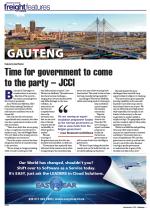Business in Gauteng is on tenterhooks as its economy – like that of the country – has taken a pounding from the Covid-19 pandemic.Joan Warburton-McBride, CEO of the Johannesburg Chamber of Commerce and Industry (JCCI), said business confidence was at its lowest ebb. Not only was the environment unpredictable and uncertain, but there was also a great deal of caution on the side of investors.“There is no doubt that we are going to face a rough time over the short to medium term,” she told Freight News.
“It is very bleak at the moment and our complications are enormous.” One of the major concerns has been the gradual demise of manufacturing in the province.“We are simply no longer producing what we used to, leaving us with very little product to export,” said Warburton-McBride. “Manufacturers have faced serious challenges – ranging from low productivity levels and skills shortages to the woes of Eskom. In many areas, we have lost our competitiveness due to the increased costs that are incurred due to the lack of power and the unreliability to deliver goods to market.”She said warnings to the government over how dire the situation was had fallen on deaf ears.
“Government has repeatedly been informed of the concerns about what is happening in the manufacturing sector and none of the warnings have been heeded. The result is that we have lost huge manufacturing capability.”
According to Warburton-McBride, efforts were being made in Gauteng to keep confidence up and support the business community.“Exports remain a big drive for the Chamber. We are running an export incubation programme funded by the German government as well as some funds from the Belgian government.
“We have limped along the last few months and, as the lockdown lifts, we are slowly picking up the pieces.”She said despite the many challenges there were still many opportunities for shippers in Gauteng.“The province has great speciality farming capability on the east side. Expensive and niche crops need to be produced close to an airport. We cannot effectively grow high-priced baby vegetables, for example, in the interior of the country as the cost to get them to market quickly is simply too high. The geography of the province makes it ideal for these niche agricultural exports.”
Warburton-McBride said grabbing these and other opportunities required an improvement in business confidence. “At present, there is a sense of hopelessness. We need the government to stand up and lead the country out of this crisis. Business is trying to get the government to understand the urgency of the situation and take action now.

